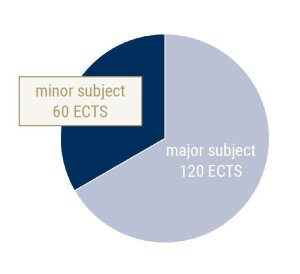- Faculty of Social and Behavioral Sciences
German Linguistics
- Degree
- Bachelor of Arts
- Supplement to degree
- minor in a multi-subject bachelor’s programme
- Admission restriction
- without admission restriction (without NC)
- Duration
- 6 Semesters
- Credits/ECTS
- 60
- Teaching language
- German
- Tuition fee
- None
- Semester contribution
- € 305,05
- Start of studies
- Winter semester
- Part-time possible
- Yes
- Institutions
- Faculty of Arts
- Institute of German Linguistics
Programme content
You will familiarise yourself with the phenomena, theories and methods of the two sub-areas of synchronic and diachronic German Linguistics. In synchronous linguistics, you will acquire theoretical and applied knowledge about the structure and use of contemporary German in all its facets. The programme follows the linguistic levels of description and analysis from sound to word, sentence and text to complex communicative processes. In diachronic German Studies, the focus is on the presentation of the oldest language stages of German in their historical and linguistic context and the development of their basic grammatical structures in texts. Your ability to read German literary texts from the Middle Ages will be promoted. You will acquire knowledge of the development of the functional levels of the German language and its history from its beginnings to the present day.
Structure
Multi-subject bachelor’s programme
Picture: Sophie BartholomeThe Bachelor's degree is the first professional qualification. The standard period of study|regular programme length is six semesters in total, during which various forms of courses (e.g. seminars, lectures or tutorials) are offered for the individual modules.
A multi-subject Bachelor's degree consists of a major subject with 120 credit points (abbreviation: LP / 1 LP = 30 hours of attendance, preparation and follow-up work|follow-up activity, learning and assessed coursework and examinations) and a supplementary subject with 60 LP.
Why study in Jena?
- German Linguistics in Jena enjoys exceptional professional and institutional independence. Six teaching areas at our own institute (Speech Studies and Phonetics, Theoretical Linguistics, Text Linguistics and Pragmatics, Linguistic Theory and Lexicology, Applied Linguistics, Computer Linguistics and History of the German Language) enable you to study the subject in its full breadth and with an individual profile.
- The rich cultural tender of the city of Jena also invites you to make discoveries outside the seminar rooms. Literary and cultural Centres such as Weimar, Leipzig and Halle are between twenty minutes and an hour by train from Jena.
- But German Studies is also part of the cityscape in Jena: Goethe came and went in Frommann's House, the home of the Institute of German Literature, and Schiller's Garden House and the Romantikerhaus are just ten minutes away.
What can you do after your studies?
Career opportunities:
Depending on the major subject chosen, the supplementary subject German Linguistics qualifies students for careers that focus on communicative and linguistic competence, e.g. in media, advertising, editing, cultural management, public relations, specialised journalism and adult education.
Downloads and links for the degree programme
What are we looking for in prospective students?
- Interest in and openness to all aspects of language
- good linguistic expression
- communicative competence
- sensitivity to processes of linguistic interaction
Admission requirements
-
University entrance qualification
A university entrance qualification, such as a general secondary school leaving certificate, is required for admission onto the study programme.
More information on university entrance qualifications can be found here.
-
Language requirements
Knowledge of one or more modern foreign languages is recommended.
Contacts
Fürstengraben 28
07743 Jena
Google Maps site planExternal link
Bachstraße 18k
07743 Jena
Telephone hours:
Mondays and Fridays (9:00 – 11:00)
Wednesdays (13:00 – 15:00)
The ASPA is primarily responsible for students in the Faculty of Social and Behavioural Sciences, the Faculty of Arts and Humanities, and the Faculty of Theology.
Postal address:
Akademisches Studien- und Prüfungsamt
Fürstengraben 1
07743 Jena
Fürstengraben 18
07743 Jena
Google Maps site planExternal link
University Main Building / SSZ
Fürstengraben 1
07743 Jena
Google Maps site planExternal link
Office hours:
We offer consultations in person, by telephone, and via Zoom. You can make an appointment by calling us on +49 3641 9-411111 (Mondays to Fridays from 9:00 to 11:00) or outside these office hours on +49 3641 9-411200. You can also use our remote help desk.
Consultation hours:
Mondays, Tuesdays, Thursdays and Fridays (9:00 to 12:20), Tuesdays (14:00 to 18:00), and Wednesdays and Thursdays (14:00 to 16:00).
Video chat: To the video chat – Zoom Videochat ZeitenMondays to Fridays (12:30 to 13:00) Password ZSB2020 Data protection informationpdf, 101 kb
University Main Building, Room E065
Fürstengraben 1
07743 Jena
Google Maps site planExternal link
Opening hours:
Information Desk (UHG; Room E0.65)
Mondays (10:00 – 12:00)
Tuesdays (13:00 – 15:00)
Wednesdays (10:00 – 12:00)
Thursdays (13:00 – 15:00)
Fridays (10:00 – 12:00)
You can also use our remote help desk at
www.uni-jena.de/service-ssz
or send us your enquiries by post.
Telephone hours:
Mondays to Fridays
(9:00 – 11:00)
Postal address:
Friedrich-Schiller-Universität Jena
Studierenden-Service-Zentrum
07737 Jena
University Main Building
Fürstengraben 1
07743 Jena
Google Maps site planExternal link
